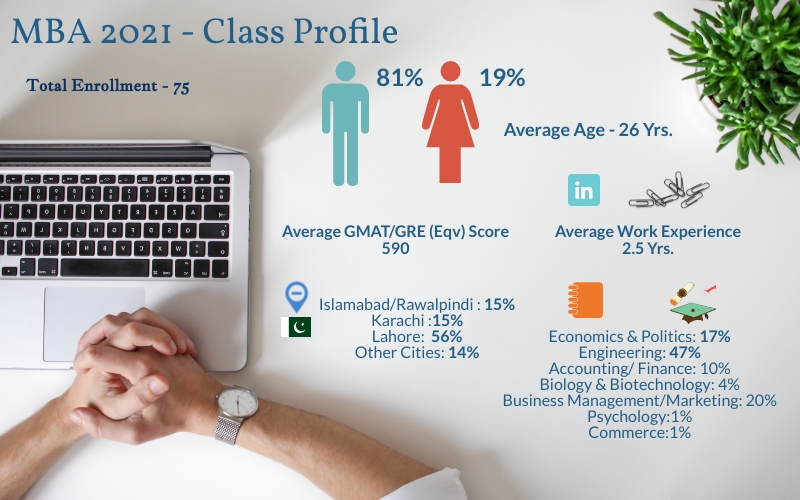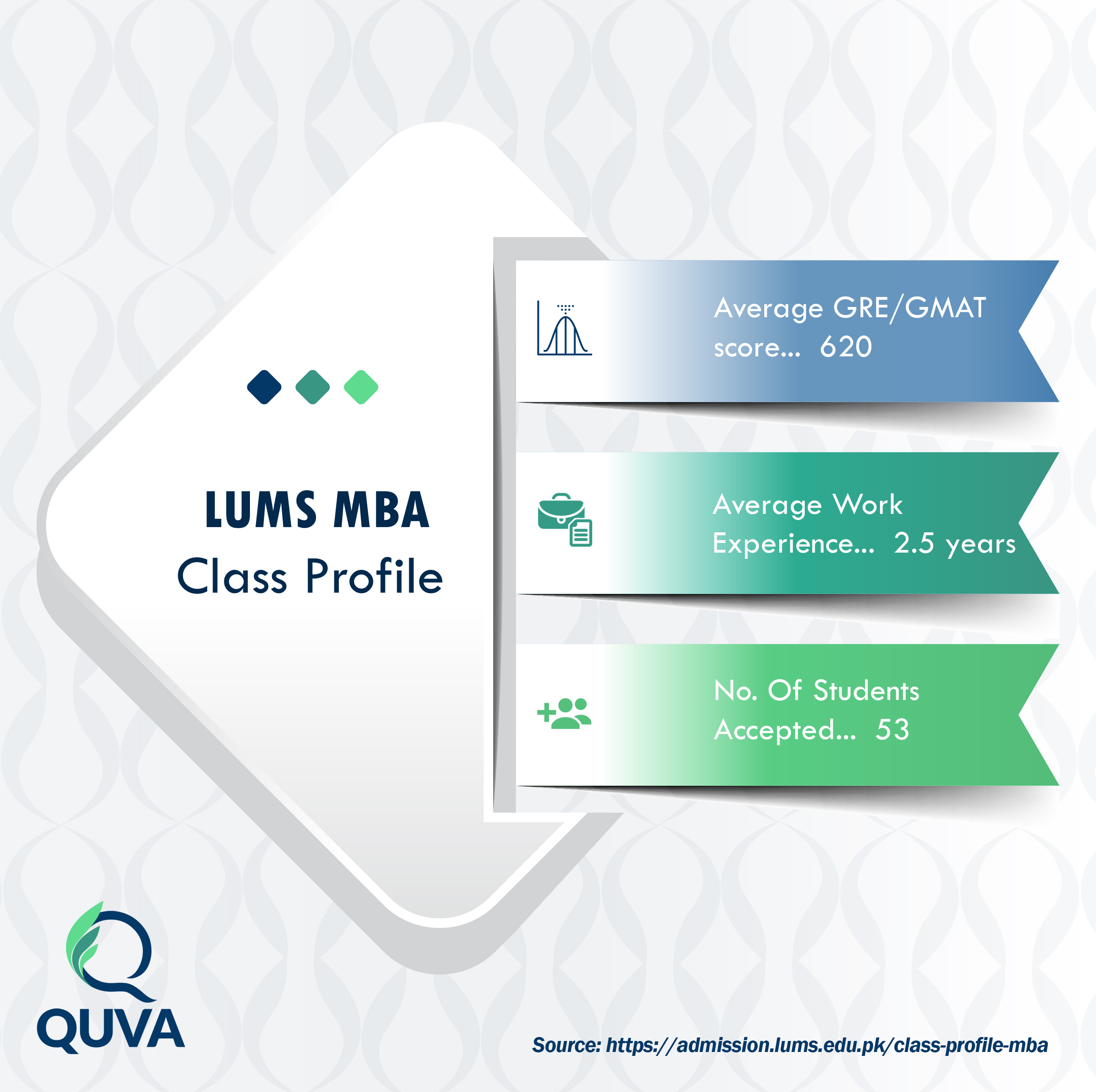It is not a news to anyone that LUMS offers one of the best MBA programs in Pakistan. In terms of its graduate employability, LUMS ranks top of the list in Pakistan and among the top 50 in Asia according to the Quacquarelli Symonds (QS) world university rankings for 2020. A big contributor to this rating is the excellent reputation that LUMS business graduates enjoy among local and international employers. Alumni of the LUMS MBA program can be found in almost all top corporations operating within and outside Pakistan, making the program an attractive choice for anyone looking to opt for a career in business administration.
All this talk about the prestige and marketability of a LUMS MBA program must have had you thinking about how it compares with some of the other programs being offered by various other institutes, and, more importantly, how you too can secure admission to the LUMS Suleman Dawood School of Business. Well, fear not! This article is going to answer most of the questions that you might have about the LUMS MBA admissions process (and if we miss something, we are always a comment or email away!).
Class Profile 2021
Article Index


What is the difference between Executive MBA and MBA?
This is one of the most common questions that students have while first starting on the MBA journey: what is the difference between a general MBA and an Executive MBA? Which one am I eligible for? Which one should I choose?
Here are some of the key differences between the two programs:
- EMBA is a less rigorous program as compared to MBA, with classes taking place generally during the weekends (although LUMS does hold some sessions during the weekdays as well). This allows the students to carry on with their normal work routine while completing their degrees.
- EMBA has a strict work experience requirement. LUMS does not accept students with less than 6 years of total work experience of which 4 years have to be managerial in nature. There is no hard and fast work experience requirement for a regular MBA degree; however, LUMS prefers students who have some experience (mostly 1 to 2 years) working in their field.
- Due to the requirement of work experience, the normal age group of students in an EMBA class ranges between 30 and 35 years, while for an MBA it usually hovers around 25 years of age.
Here is a detailed comparison of EMBA and MBA offered by LUMS:
| Executive MBA | MBA | |
| Work Experience | At least 6 years (with 4 years managerial experience) | No previous work experience required (though preference is given to candidates with 1 to 2 years of work experience) |
| Test requirement | GRE/GMAT/NTS | GRE/GMAT/NTS |
| Class schedule | Mostly during weekends | Mostly during week days |
| Tuition Fee | 329,835 PKR per module (1st year), 412,300 PKR per semester (2nd year) | 441,600 per semester |
Comparison with other Universities (LUMS vs IBA vs LSE)
Although LUMS has one of the most widely known business programs in Pakistan, it is certainly not the only one. A number of other universities are also running some very successful MBA programs which might be worth looking at. Two of the most well known institutions are Lahore School of Economics (LSE) and Institute of Business Administration (IBA). In this section, we will take a look at how these two institutes compare to LUMS when it comes to business education.
IBA MBA
Institute of Business Administration in Karachi is well known for producing some very well known personalities and business professionals. Asad Umar, former CEO of Engro, former Finance Minister of Pakistan and current Minister for Planning and Development is a proud MBA graduate from IBA. It is also a great choice to consider if you are a resident of Sindh and are looking to study in Karachi, the biggest city in Pakistan.
LSE MBA
Lahore School of Economics is another good option for business education in Pakistan. According to Higher Education Commission’s rankings since 2015, it is the second best Pakistani university for business education, making it an option worth considering.
Given below is a detailed comparison of the three programs:
| LUMS | IBA | LSE | |
| Duration (MBA) | 2 years | Minimum 2 years for morning program and 3.5 years for evening program | 2 years (1.5 years for business graduates and professionals fulfilling certain criteria) |
| Duration (EMBA) | 2 years | Minimum 2.5 years and maximum 7 years | 2.5 years |
| Work experience requirement (MBA) | None (preference given to those with 1 to 2 years of experience) | 2 year work experience | None |
| CGPA requirement (MBA) | None mentioned | 2.5 CGPA or 60 percent marks | 2.5 CGPA for 2 years, 3.0 for 1.5 years program |
| Work experience requirement (EMBA) | 6 years (with minimum 4 years of managerial experience) | Minimum 3 years of experience (5 years of post qualification experience is preferred) | 3 year of professional experience |
| CGPA requirement (EMBA) | None mentioned | 2.5 CGPA or 60 percent marks | 2.5 CGPA |
| Test requirement | GRE/GMAT/NTS | IBA Aptitude test | LSE Entrance test |
Securing Admission to the LUMS MBA/EMBA
Now that we have looked at a few basic facts about the LUMS MBA program and compared it with other competitive options, let’s dive into the admissions requirement and look at how much weight is usually assigned to each part of the application.
A typical LUMS MBA application consists of:
- Academic record (your Bachelors transcript, Intermediate result etc.)
- Admission test scores
- Work experience (optional but preferred in case of MBA, mandatory in case of EMBA)
- Two recommendation letters
- Interview
Previous Academic Record
The most important part of your previous academic record is your undergraduate CGPA. Although LUMS does not explicitly mention any cut off for CGPA, it is safe to assume that similar to IBA and LSE, candidates with CGPA higher than 2.5 would be in a much safer place than those belonging to the other side of the spectrum. However, a very strong application in other regards might compensate a lower GPA; so it’s important to ensure that if you have a humble academic background, you perform proportionally well on those parts of your application which are still under your control, namely the admission test, work experience and recommendation letters.
GRE or GMAT? Which test should I take?
LUMS accept General Record Examination (GRE), General Management Admission Test (GMAT), or National Testing Service General Aptitude Test (NTS GAT) for applying in its MBA/EMBA program. NTS is a recent inclusion in the list of approved admission tests for LUMS so the cut off and average performances for that particular admission test are still unclear. However, GRE and GMAT have enjoyed their position as the most prominent admission tests for a while now.
- For GRE, a score above 310 is considered safe for admission to the LUMS MBA program
- For GMAT, a score above 620 is usually considered safe for admission to the LUMS MBA program
These are just some rough numbers to give you an idea of what the average application which clears the first part of LUMS MBA admission process has in terms of admission test scores. The important thing to note here is that depending on other parts of your application, this number can change drastically. For example, if you have a strong academic background and work experience, a lower GRE/GMAT score might not be a huge hurdle during the admission process. However, if you are lacking in other parts of your application, an average score in GRE/GMAT would still fall short of getting you into that coveted MBA program. So it is important to do a bit of self evaluation and adjust your target scores accordingly.
You might also be wondering which admission test would be better for applying to LUMS? GRE, GMAT or NTS? The answer is very simple: whichever test you can attempt more easily; depending, of course, on the cost, test location and the test date among other applicable factors. LUMS makes no distinction on the basis of the type of test being taken, instead only the performance of the candidate in their respective test is considered.
Recommendation Letters
Recommendation letters are a strong part of your application no matter which higher studies program you are applying to, and this certainly holds true for LUMS MBA also. LUMS requires two recommendation letters as part of the MBA or Executive MBA applications.
Interview
The last and one of the most intimidating parts of the admissions process is the interview. Remember, only a handful of the applicants will be called for an interview. So if you are short listed for the interview, it is already a very positive sign and signifies that only one last hurdle is left between you and the MBA program that you are dreaming to get into. Interview experiences vary and the process depends on a number of different factors including, but certainly not limited to, your previous education, work experience, and test scores. Considering the variation in the format and judging criteria of the interview process, it would not be possible to discuss this particular part of the application process in detail here.
Is LUMS MBA worth it?
Now that we have discussed the admissions process and its intricacies, the question that still remains to be answered is probably also the most important one: is MBA from LUMS worth it? The MBA program isn’t affordable by any definition of the word and with regular MBA, it is almost impossible to study full-time and work side by side to support yourself financially. With a fee of nearly 400,000 Rupees per semester for both MBA and Executive MBA, it makes sense to question whether going through this program would be worth your time and money. We will tackle this question in two parts, separately analyzing the worth of LUMS business program for both the general MBA and the Executive MBA.
MBA
The general MBA option usually requires a bit more commitment and effort from students as it is normally not possible to pursue an MBA at LUMS while continuing your job. So for around two years, you will lose most of your financial support while also shelling out hundreds of thousands rupees per semester. It is a difficult decision to make and certainly begs the question whether it is worth the time and money that it demands.
And the answer to that mostly is… Yes. It is indeed worth the time, effort, and money that you will put into getting an MBA from LUMS. If you are coming from a technical background, for example a computer science degree, and are not overly enthusiastic about coding for the rest of your life, an MBA definitely helps switch career paths. For business graduates who have done finance or BBA in their bachelors can also get a significant jump in their salaries and become a more lucrative hire for companies after completing the MBA program.
MBA from LUMS is generally in a very good demand all across Pakistan, with some firms and companies strictly hiring only LUMS MBAs.
Executive MBA
Things get a little bit more complicated when it comes to the Executive MBA. Commonly known as MBA for professionals, it is meant for experienced individuals who have considerable amount of managerial experience already. They are also not expected to leave their current jobs to be able to complete the program. However, there are a few concessions that LUMS requires from the EMBA candidates, which include sparing time for some sessions that might conflict with their work hours.
There are some companies which also sponsor EMBA for their senior employees, making sure that they are up to date with modern management styles, in turn making them more useful for the company.
So for EMBA to be worth it, it depends on a number of different factors, the biggest of which is the support from your current employer. If they are on board, it can be a big step forward in your career. Otherwise, it might be a bit more difficult and would require you to negotiate a better salary and status after completing the program or looking for a more lucrative position elsewhere.
